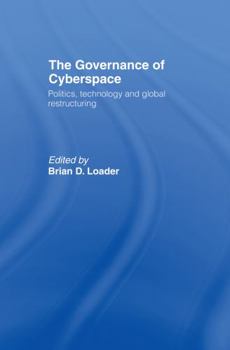The Governance Of Cyberspace: Politics, Technology and Global Restructuring
Select Format
Select Condition 
Book Overview
Issues of surveillance, control and privacy in relation to the internet are coming to the fore as a result of state concern with security, crime and economic advantage. Through an exploration of emerging debates regarding the possible desirability, form and agencies responsible for the regulation of the internet and an analysis of issues of surveillance, control, rights and privacy, The Governance of Cyberspace develops contemporary theories and considers issues of access, equity and economic advancement.
The Governance of Cyberspace encourages a more informed discussion about the nature of the changes which the new information and communications technologies (ICTs) are heralding in and will be of considerable interest to all those who are concerned about the technological shaping of our political future.
The Governance of Cyberspace encourages a more informed discussion about the nature of the changes which the new information and communications technologies (ICTs) are heralding in and will be of considerable interest to all those who are concerned about the technological shaping of our political future.
Format:Hardcover
Language:English
ISBN:0415147239
ISBN13:9780415147231
Release Date:March 1997
Publisher:Routledge
Length:270 Pages
Weight:1.05 lbs.
Dimensions:1.0" x 5.6" x 8.7"
Customer Reviews
1 rating
The Governance of Cyberspace: A Review
Published by Thriftbooks.com User , 21 years ago
This interesting volume is the end result of a small conference held at the University of Teesside in April 1995. It contains a combination of essays using social scientific and literary analysis to "advance the debate about the governance of cyberspace" (p. xii).The introductory essay by the editor of the volume, Brian Loader, defines cyberspace as "a computer-generated public domain which has no territorial boundaries or physical attributes and is in perpetual use." While the current form that cyberspace takes is roughly coterminous with the Internet, it need not be so in the future. The key question is how this thing is to be governed.Loader identifies a number of perspectives on what cyberspace is and how it should be governed. He identifies the cyber-libertarians as an important group who oppose any government intervention in cyberspace. An influential member of this group is John Perry Barlow, former lyricist for the Grateful Dead and now a rancher in Wyoming. Barlow was one of the founders of the Electronic Frontier Foundation (EFF).The editor contrasts cyber-libertarians and other cyberenthusiasts with authors like William Gibson, of thescience fiction genre called "cyberpunk," and political philosophers like Jean Baudrillard who stress the dangers of the illusion of reality created by computer technology. The addition of yet another layer of intermediation augments the already extensive alienation of humans from nature and from each other. The nightmare scenario is a future in which no one interacts face to face anymore but pretends to do so while actually sitting in a room hooked up to fancy equipment.While there is no specific political program associated with this line of thought, nevertheless its warnings about the dangers of new forms of criminal and antisocial behavior are echoed in essays in this volume on policing crime and regulating hate speech on the Internet by Klaus Lenk, Charles Raab, Dorothy Denning, Puay Tang, and Michael Whine. The flip side of the coin is the rise of virtual communities and the ability of widely geographically dispersed people to organize social movements at very low cost. The Internet is democratic in one very important respect: It reduces transaction and communications costs for everyone who has access to it. In this respect, it is an important facilitating factor in the current tendency toward economic globalization.The editor discusses the parallels between the ideas of postmodernist theorists and those of observers and commentatorson the growth of networks-parallels that are also explored in essays by David Lyon, Simon Baddeley, and Paul Frisson. Postmodernist theorists like Jean-Francois Lyotard have argued that postmodernism can be characterized as the replacement of "grand narratives" with "little narratives" and with a new stress on subjectivity and the need for multiple voices in public discourse.According to postmodernists, these replacements are desirable given the 20th century's genocidal e





